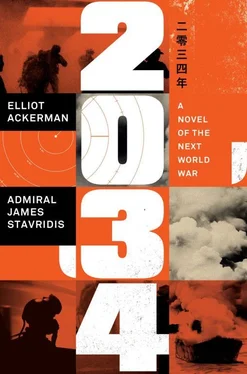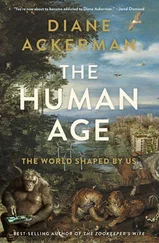The Zheng He now appeared on the horizon, as small as a postage stamp.
As his plane lined up its approach, Lin Bao imagined it wasn’t all that different than the final journey taken by the Hornet. He recalled Minister Chiang’s reaction to the news that several sailors, two junior officers, and Admiral Ma Qiang had been killed in this American kamikaze attack. “That was a very brave pilot,” the minister had said of the American, saying nothing of Ma Qiang, whose glory-hunting seemed to annoy Minister Chiang far more than his death seemed to disturb him. To Lin Bao, he had only added, “I suppose you’ll be getting your command after all.” And if Minister Chiang had been privately dismissive of Ma Qiang and what he perceived to be the undue risks he’d taken, publicly the defense minister and the entire membership of the Politburo Standing Committee had extolled the virtues of Admiral Ma Qiang, the hero of what they had already enshrined as the Victory of the South China Sea.
Nothing like replacing a hero, thought Lin Bao, as the plane made its descent toward the flight deck. He could hear the familiar chatter of air traffic control through his headset as they held their glide path. Only two of the four arresting wires on the deck of the Zheng He were operational. The one-wire and four-wire had been damaged during the battle and still, more than a week later, had gone unrepaired, a deficiency Lin Bao made a note of as he imagined the work ahead when preparing this crew for the battles that surely awaited them.
Some low-level turbulence then caused their aircraft to pitch violently. As they descended below one thousand feet, Lin Bao noticed that the flight deck was crowded, or at least more crowded than usual, as off-duty members of the crew assembled to catch a glimpse of their new commander’s landing. When their aircraft hit the deck, it touched down a little long. The pilots throttled the engine to give their aircraft the extra power for a second pass.
The pilot who had flubbed the landing turned toward Lin Bao in the jump seat and sheepishly apologized. “Very sorry, Admiral. That turbulence knocked us off our glide path. We’ll get you in on the next pass.”
Lin Bao told the pilot not to worry about it, though privately he added this failure to the deficiencies he was cataloging at his new command.
As they gained altitude, perhaps the pilot could sense Lin Bao’s disappointment, because he continued to prattle on as he lined up their aircraft for a second approach. “What I was saying before, sir,” the pilot continued, “about landing on the first pass being good luck for your command—I wouldn’t put too much stock in that either.”
Another jolt of turbulence hit the aircraft.
“I remember when Admiral Ma Qiang took command,” the pilot added cheerfully. “Variable winds that day. His plane didn’t land until the third pass.”

13:03 April 28, 2034 (GMT+5:30)
New Delhi
If not for the Chinese government’s decision to wait twenty-four hours before releasing the news of its victory in the South China Sea, Chowdhury never would have sprung Wedge from the Iranian embassy. In the days after that operation, Chowdhury had begun to see Wedge’s detention as a first misstep in what had otherwise been a series of perfectly executed moves by the Chinese, beginning with the phone call from their M&M-eating defense attaché about the Wén Rui those weeks before.
The release of Major Mitchell had been a risky proposition. When Chowdhury first appeared in his room at the Iranian embassy, Wedge had looked decidedly disappointed. He later told Chowdhury that he’d been expecting a Red Cross nurse, not a string bean of a diplomat. This disappointment immediately dissipated when Chowdhury explained that the Indian government had that very morning negotiated with the Iranians for his release into their custody. Chowdhury added only one word: “Hurry.” Chowdhury and Wedge were rushed out a back service entrance by two officers from India’s Intelligence Bureau.
Later, when Wedge asked Chowdhury how his uncle had convinced the Iranian ambassador to release him into Indian custody, a move that certainly wasn’t in the best interests of the Iranian government, Chowdhury had answered with a single Russian word: kompromat .
“ Kompromat ?” asked Wedge.
“Little boys,” Chowdhury answered, explaining that India’s Intelligence Bureau made it a point to develop and cache bits of leverage over any foreigner, particularly one of ambassadorial rank. And it just so happened that this ambassador was a pederast. When Chowdhury’s uncle had gone to the Iranian ambassador with the facts, the ambassador’s calculation had been simple. He would face a lesser reprimand from his government for being duped by the Indians than he would if his sexual proclivities ever became known. “That’s why they released you, Major Mitchell.”
“My friends call me Wedge,” he said, a wide grin stretching across his still-bruised face.
Chowdhury left Wedge at the hospital with the embassy staff, who would arrange his flight back to the US, or to wherever else the Marine Corps saw fit to send him. Chowdhury needed to return to Washington, to his duties, and to his daughter. From the hospital he was taken by car to the visitors’ annex of the embassy, where he would collect his things and head to the airport. When he arrived at his quarters, he was in such a rush to pack that he walked straight to the bedroom, right past his uncle, who was sitting on the living room sofa, waiting patiently.
“Sandeep, may I have a word?”
Chowdhury jumped when he heard the baritone voice behind him.
“Sorry to startle you.”
“How’d you get in here?”
The old admiral rolled his eyes, as if he were disappointed that his nephew would ask such a naive question. Patel had in a single morning used his connections within his country’s intelligence services, diplomatic corps, and military to arrange the release of a downed American flyer from Iranian custody; if he could handle that, he could certainly handle one locked door. Nevertheless, Patel gave his nephew a proper answer: “A local member of your embassy staff let me in….” Then, as if sensing this explanation wasn’t quite sufficient, he added, “Someone we’ve done some favors for in the past.” Patel left it at that.
Chowdhury agreed to have a drink with his uncle. The two of them stepped outside and into a waiting black Mercedes sedan. Chowdhury didn’t ask where they were going and his uncle didn’t tell him. They barely spoke on the drive, which was fine with Chowdhury. In the few days he’d been in New Delhi, he’d hardly left the embassy complex; now, for the first time in his life, he had an opportunity to absorb the city. He was struck by how much it differed from his mother’s descriptions, and from the photos he’d seen growing up. Gone were the dust-choked streets. Gone were the ramshackle shanties overflowing into those same streets. And gone, too, were what his uncle once called “the inconvenient and combustible masses prone to rebellion.”
The streets were clean. The homes were new and beautiful.
The shift in India’s urban demographics had begun two decades before, under President Modi, who along with the other nationalist leaders of that era had sloughed away the old India by investing in the country’s infrastructure, finally bringing the Pakistani threat to heel through a decisive victory in the Ten-Day War of 2024, and using that victory to build out India’s military.
Chowdhury could have gleaned the history simply by looking out the car window, at the streets without litter, at the proliferation of glass high-rises, at the packs of impeccably turned-out soldiers and sailors ambling down the freshly laid sidewalks, on leave from their tank divisions or on liberty from their ships. Modi and his acolytes had brushed away all resistance to their reforms, hiding the vast social wreckage. This makeover was hardly complete—much of the countryside still had a distance to go—but clearly the road ahead was smoothing as the century unfolded.
Читать дальше













